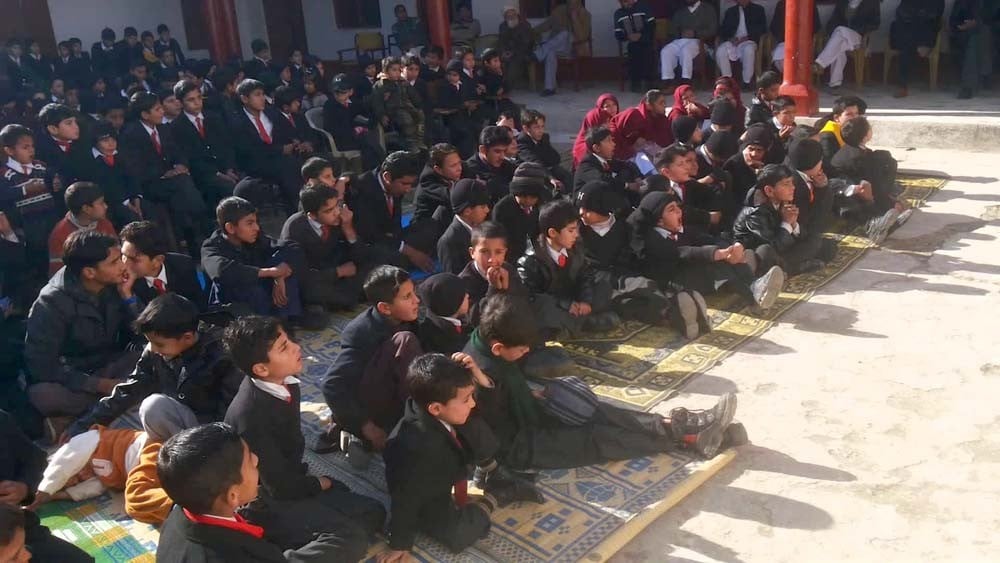
Two students of government schools in KP who topped in Matric and F.Sc attribute their success to their teachers

The recent, inspiring tales of triumph of two young boys -- Malik Faisal and Shah Faisal who topped the Board of Intermediate & Secondary Education (BISE) this and last year from Abbottabad and Malakand respectively have something deeper to appreciate and celebrate.
The manifest success of these boys, which brought moments of pride, awe and cash prizes of Rs. 500,000 each, when put in contrast to their social and personal challenging circumstances tells us of something bigger. Malik Faisal is a polio survivor and Shah Faisal is the child of a samosa seller. Education is a social equaliser.
Both Faisals attribute their remarkable success to the catalytic role of their teachers. Their fabled success informs that quality education is not possible without high quality teachers. It reinforces the veracity of what Nelson Mandela said, "Education is the most powerful weapon which you can use to change the world."
A challenging part of teaching is to treat every student equally regardless of their potential and background. In government schools specifically, majority of the students come from low-income family backgrounds, they have no mentor at home therefore the environment at school and role of a teacher becomes vital to every student’s future. As Henry Brooks Adams said, "Teachers affect eternity; no one can tell where their influence stops".
Back to the triumph of our boys, the BISE, Abbottabad, announced the results of Secondary School Certificate examinations recently. Of the 58,253 students of arts group who took the exams Malik Fasial secured top position. "I am not a disadvantaged child who cannot achieve in life; I have topped the Secondary School Certificate exams of the Board of Intermediate and Secondary Education (BISE), Abbottabad, despite my disability. This is just the beginning. I want to become a professional and serve my country, especially people with disabilities," he said.
Malik Faisal was diagnosed with polio virus when he was only four-year-old but he never allowed his disability to become his weakness.
What distinguishes Faisal from other students is his polio-related disability, poor family background and his dependency on other family members. His achievement has convinced everyone that disability is not a limitation -- even a disadvantaged student can do exceptionally well if he is provided dedicated and ambitious teachers and good school environment. Faisal believes his hard work, his family’s support, good government school and motivated teachers made a perfect combination which led him to this success.
"My school was 200 meters away from home, often my mother or uncle would take me to school. My younger brother used to carry my heavy school bag. While I was depending on my family, my mind was free and my teachers were supportive. They spent more time on me and made more effort given my disability while I focused on achieving excellence in exams. Thanks to Almighty Allah that my dream has come true with the prayers of my parents and hard work of my teachers," says Malik Faisal who topped in Martric from Abbottabad BISE.
Last year, another student, Shah Faisal topped the Malakand Board’s SSC exams and received a cash prize of Rs500,000 from the chief minister and education minister. Shah Faisal’s father is a well-known samosa seller in his village. It was a remarkable day for the entire family when Faisal topped in F.Sc. Again the family believed that a good and dedicated teacher enabled their son to obtain such distinction.
The two students are among many other students of government schools who obtained top positions in board exams and highlight the fact that the role of teacher is key to a student’s success and a good teacher not only makes his students’ future but also truly serves his country.
The KP government has been working on various reforms in education sector which have started giving results. According to a recent survey conducted by an international firm, 34,000 students migrated from private schools to the government schools when their parents got convinced about the quality of education in the government schools, which is free of cost for every child. The KP government has started vouchers’ scheme in which poor and disadvantaged students are identified and paid for their education in the school nearest to their residence.
The situation it seems would further improve in the coming years when no school will be left without basic facilities such as toilet, clean water and electricity. The KP government has already spent more than Rs.14 billion on infrastructure and has achieved more than 93 per cent of the target throughout the province. Teachers’ trainings are ongoing and new teachers are hired through a highly competitive process. Teachers’ attendance has remarkably improved as a result of regular monitoring. The main focus of improvement in the system is a child and his future.